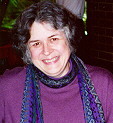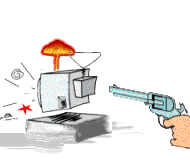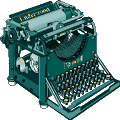| Also available on the Net are e-mail lists or bulletin boards to which you can subscribe (usually for nothing). The list I subscribe to is called DOROTHYL (after Dorothy L. Sayers) and has over 2000 subscribers, Kerry Greenwood being one. Every day all the letters (or postings) to this list are collected together by the system's operators, who moderate the list at Kent University in the US, and then redistribute them to all the members of the list.
So on a daily basis, you can receive up to a hundred postings from people you have never met face to face but talk to regularly in that electronic space which William Gibson has called 'cyberspace'.
And here we should make it clear that cyberspace as a place does not exist except as an abstract idea. It is what might be called a virtual world and as such is perhaps more common to readers of science fiction than crime. But we all know how prophetic science fiction can be - so we might just suspend our disbelief here tonight - and imagine cyberspace as the place where we can all meet and talk when we're on the Net - and as a site for possible crime.

Jenny Pausacker
One other point of information. Access to the Internet also gives you access to the World Wide Web which is that network of 'sites' created by individuals, groups and corporations where they 'publish' various sorts of information. For example, you can 'dial' the World Wide Web address of mystery magazines and even mystery writers such as Jenny Pausacker's' favourite Barbara Paul where you can see the covers of all her books and maybe even read a section of her latest book in progress if she feels inclined to put it there.
All in all - for fans of crime - never mind the writers of crime - the Internet is a resource of infinite possibilities. But before we get onto that, let's begin at the beginning. Most of us (I know it's true in my case) got a computer in order to write. I'll let Kerry Greenwood tell the story here.
Kerry Greenwood:
Being of an archaeological age, I have a confession to make. I began writing with a pen and ink. It was pale, watery blue-black ink and in seconds I had a permanent stain on my index finger and more ink splattered over my person than I had person to splatter it over. I also found that I has a talent for attracting dirt, and a lifelong bitter envy of one of the Susans in my class who I saw with my own eyes slide down a mud bank at a school picnic in white jeans and come up without a mark on her.
 This may have coloured my attitude to ink. So, also, may have the fact that my long plait had a tide mark at the end where the boys behind dipped it into the inkwell.
This may have coloured my attitude to ink. So, also, may have the fact that my long plait had a tide mark at the end where the boys behind dipped it into the inkwell.
But I was enchanted with the idea of putting words onto a page. The first whole sentence I wrote was "The world is round and spins in space" and I stared at it fascinated by the concept that someone who did not know me might read it when I wasn't there and learn this important fact. It was magical. I was addicted from that time - Grade One.
|

 I myself have recently been corresponding with British crime writer Val McDermid whom I interviewed last year and she informed me via the Internet that her recent book, The Mermaid's Singing, has won the prestigious Golden Dagger Award of the Crime Writers' Association [in Britain].
I myself have recently been corresponding with British crime writer Val McDermid whom I interviewed last year and she informed me via the Internet that her recent book, The Mermaid's Singing, has won the prestigious Golden Dagger Award of the Crime Writers' Association [in Britain].

 This may have coloured my attitude to ink. So, also, may have the fact that my long plait had a tide mark at the end where the boys behind dipped it into the inkwell.
This may have coloured my attitude to ink. So, also, may have the fact that my long plait had a tide mark at the end where the boys behind dipped it into the inkwell.
 When I was about fourteen, I discovered typing. I failed, of course, partly for plastering slogans like 'Make Love Not War' and 'Fighting for Peace is Like Fucking for Virginity' all over my typing folio but partly because they made me try to touch-type in four-four to a terrible music typing tape in three-four and you can't do that unless you've got tin ears.
When I was about fourteen, I discovered typing. I failed, of course, partly for plastering slogans like 'Make Love Not War' and 'Fighting for Peace is Like Fucking for Virginity' all over my typing folio but partly because they made me try to touch-type in four-four to a terrible music typing tape in three-four and you can't do that unless you've got tin ears. I had a manual machine called Gabrielle Adler - I did wonder why she had that name - and we fought furious battles. She would jam all her keys and I would either unlock them very painstakingly or, if it had been a bad day, thud both fists on the keyboard to show her and then unpick them very carefully. Then I found out that the design of a keyboard was deliberately invented to make sure that no-one could type fast without jamming the keys, something to do with printing and typesetting machines, and decided that I'd just go on writing books by hand.
I had a manual machine called Gabrielle Adler - I did wonder why she had that name - and we fought furious battles. She would jam all her keys and I would either unlock them very painstakingly or, if it had been a bad day, thud both fists on the keyboard to show her and then unpick them very carefully. Then I found out that the design of a keyboard was deliberately invented to make sure that no-one could type fast without jamming the keys, something to do with printing and typesetting machines, and decided that I'd just go on writing books by hand.